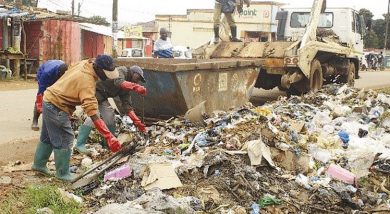A toilet that feeds a family
 Most households in Malawi look up to their farms for food. The majority yield insufficient harvests because they cannot afford a bag of fertiliser to nourish their crops. Access to subsided fertiliser remains dismal, leaving poor households under the shadow of hunger. However, as Nora Baziwelo from Mtandire slum in Lilongwe proves, there is still hope. Our correspondent AUSTINE JERE tells her story.
Most households in Malawi look up to their farms for food. The majority yield insufficient harvests because they cannot afford a bag of fertiliser to nourish their crops. Access to subsided fertiliser remains dismal, leaving poor households under the shadow of hunger. However, as Nora Baziwelo from Mtandire slum in Lilongwe proves, there is still hope. Our correspondent AUSTINE JERE tells her story.
On a maize-packed veranda sat two teenage boys loading grain into 50-kilogramme bags. Just a hoof inside the house stood 25 bags already filled with grain. The floor was littered with abundant maize cobs, left to dry.
“All this maize is from my farm, but I don’t apply chemical fertiliser. I use human manure,” chirped Nora Baziwelo.
Like many slum dwellers, Basiwelo has no formal employment. She sells compost manure for a living and her husband, Edimon, is a carpenter.
She says their combined revenue is too little to buy enough chemical fertiliser, currently selling above K15 000 a bag, to nourish their two-hectare farm.
Yet, the Mtandire resident boasts of plenty of food every year. But what oils the wheels to keep her family nourished all year round is something rare and unconventional—a toilet.
Baziwelo uses Ecological Sanitation (Ecosan) toilet to compost waste. The toilet offers her cheap or free fertiliser and aids household food security.
“We used to struggle to buy fertiliser but since I started using the toilet manure, I don’t need fertiliser anymore,” she said.
After digesting their meals, the Baziwelos relieve themselves in an ecosan toilet. The feacal matter is then contained in a sanitation installation for disease causing germs to die off.
The process, which takes six months, produces safe soil from faeces and fertiliser from urine. She uses the resultant human manure to nourish her farm.
Baziwelo, a member of the Malawi Homeless People’s Federation, said when the Centre for Community Organisation Development (CCODE) first introduced the idea of the ecosan toilet to her in 2008, she doubted its utility.
However, after trying it she realised that human excrement is no waste product but holds nutrients to fertilise land and boost her crop production.
“Every six months I harvest enough manure which I apply to my crops and the yields are always bumper” she said.
In the 2013/2014 National Budget, government allocated K60.1 billion to the Farm Input Subsidy Programme (Fisp) to enable poor households to access a bag of basal or top dressing fertiliser at K500.
But with politics and corruption always preying on the subsidy programme, many poor farmers do not access the inputs.
Eventually, most poor families continue producing lower and lower yields, much of which is depleted before the next harvest.
But when most granaries are empty, prices of the staple grain skyrocket, stretching the poor’s economic muscle to a rupturing limit.
Just two months ago, a 50-kg bag was selling at around K10 000.
Baziwelo receives no fertiliser subsidy coupons. Yet, that people spend nights in Admarc depots queuing for maize is some shock she gets from radio bulletins, telecasts and newspapers.
“I yield enough maize for the whole year, so I don’t buy any additional food,” she said.
In October 2012, the Malawi Vulnerability Assessment Committee reported that about 2 million people (about 13 percent of the population) were food insecure.
Obviously, this hunger threatened population largely comprises the poor, who perennially record lean harvest because they cannot afford expensive fertiliser for their farms.
But like Baziwelo, they too can improve their food security with just an ecosan toilet within their compound.
Research indicates that one person produces enough wastes to supply nutrients to produce 250 kilogrammes of cereals every year.
That means for a population of 15 million people, Malawi can produce 3 750 000 metric tonnes of maize annually using ecosan toilets, a figure which equals this year’s maize production estimates of 3.7 metric tonnes as reported by the Global Information and Early Warning Systems (GIEWS) on food and agriculture.
Already, Baziwelo has twenty-five 50-kg bags. Her veranda has abundant unpacked grains and some maize cobs are drying on the ground floor.
“I expect to pack at least 35 bags more when all the is maize dry,” she said.
Baziwelo said the toilet-supported harvest is entirely for subsistence. It feeds her extended family of 12, often sustains relatives and seldom supports hungry neighbours, who also admire the wonders of the ecosan toilet.
“At first, I could sell some of my produce, but now I feed a bigger family so I wouldn’t risk selling the maize,” she said.
Despite its potential to replace chemical fertiliser and help save billions of public money government spends subsidising farm inputs, the use of ecosan toilets remains an exclusive of a few households.
For instance, in Mtandire, a habitant of about 18 000 people, only eight families use the ecosan toilet.
That means the rest will continue bribing chiefs for a subsidy coupon or else risk yielding less and brace to go to bed on empty bellies.
With the sustainability of the subsidy programme looking foggy, maybe it is time Fisp was aborted and its funds channeled towards construction of ecosan toilets to give poor households sustainable fertiliser manufacturing factories, whose raw materials are already running in their bodies—daily.





